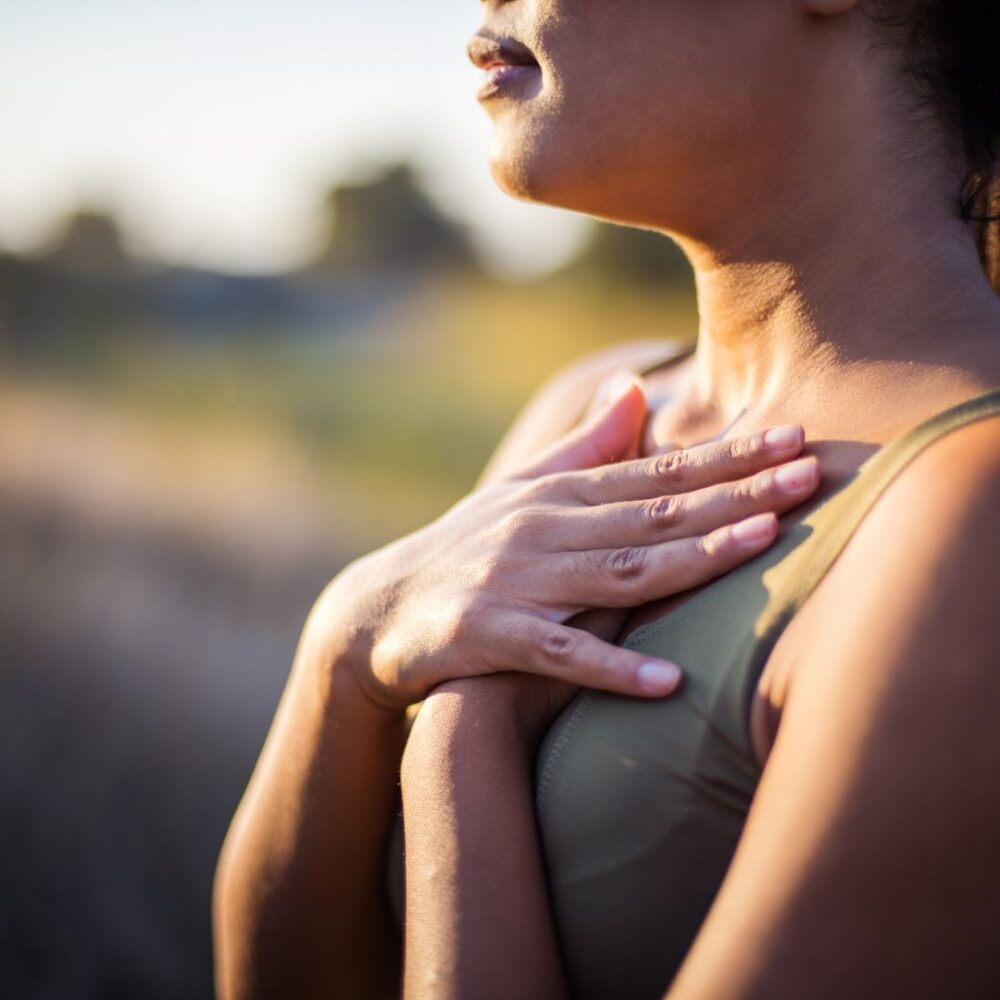
Picture this: you’re in a moment of intense anxiety or an extremely stressful situation. Then everything feels tight and it's tough to even take a deep breath. I've been in that kind of situation, and I'm sure you can relate to the uncomfortable feeling of diaphragm tightness as well. In fact, this sensation is actually not just in your heads. Just so you know, there's a real connection between anxiety and a tight diaphragm.
So whats the connection? The diaphragm is a muscle located below the lungs, and is constantly relaxing an contracting allowing us to breath in the air, and move out the carbon dioxide. Like all muscles, it is controlled by the nervous system, and when you get anxiety or panic attacks, your muscles can change.So in this blog, let's delve into how anxiety symptoms can manifest in many ways like diaphragm tightness. I'll also share some quick tips so you can manage stress and relax your diaphragm to breathe easier.
Article Highlight:
- Too much anxiety that’s rooted from different reasons like excessive worry or extreme fear may cause you to hold your breath, leading to a tight diaphragm and affecting well-being.
- Natural strategies to combat anxiety like meditation, deep breathing, exercise, and relaxation techniques can help you handle it better.
- I've also found that scheduling time for relaxation, creating a calming environment, and trying natural supplements like CBDA can make a big difference in lowering anxiety levels.
- But do remember this: consistency and regular practice are key to seeing lasting positive changes in our anxiety levels and quality of life.
The Science Behind Tight Diaphragm When Anxious
When you're extremely anxious you may feel like your diaphragm is super tight and there's actually some fascinating science behind that! So what happens is when you feel very threatened or too stressed out, your body goes into this mode called the "fight-or-flight" response.
This mode is like your own personal superhero, ready to protect us from any harm as if you're in actual danger. This response is controlled by the sympathetic nervous system, which works like the body's command center for defense mechanisms during tough times.
So, when you're under excessive fear or feel threatened by something, your sympathetic nervous system jumps into action and releases these stress hormones, like adrenaline and cortisol. These hormones can lead to anxiety and cause physical symptoms like rapid heartbeat, as well as emotional response. And that tight diaphragm feeling, that's actually just one of the many ways our body's response to the anxiousness you're facing.
Activation of sympathetic nervous system from anxiety
While a tight diaphragm is a common symptom of anxiety disorders, there are other symptoms also associated with excessive activation of the sympathetic nervous system. The Cleveland Clinic highlights the following:
- Digestion problems
- Dizziness
- Heart rhythm issues, such has increased heart rate
- Sexual dysfunction
- Constipation
- Difficulty concentrating
If your wondering about your anxiety symptoms are causing physical problems, check in with your physician.
How Natural Methods Help Alleviate Anxiety
Natural methods use non-pharmacological and non-invasive techniques to manage and alleviate anxiety disorders. These strategies involve different practices that promote relaxation, mindfulness, and overall well-being, without relying on anti anxiety medications or other medical interventions to combat anxiety.
Incorporating natural anxiety relief techniques into a stress management plan is crucial. This is because excessive anxiety may lead to mental illnesses like social anxiety disorder, generalized anxiety disorder, and even panic disorder. Here are the benefits of natural methods to combat mental health conditions.
- Fewer side effects: Natural anxiety relief methods typically have fewer side effects or no side effects at all than pharmacological treatments, making them safer for many people.
- Greater sense of control: Practicing natural stress anxiety techniques can empower you to reduce symptoms of anxiety so you can develop healthy coping strategies.
- Holistic approach: Natural anxiety relief methods often address the mind and body, promoting overall well-being and balance.
- Cost-effective: Many natural techniques to treat anxiety can be practiced at little to no cost, making them an accessible option for many people on a budget.
I know we all want to relieve symptoms of anxiety fast, but for long term health, you gotta make it a daily practice.
You dont get healthy from eating one salad or going to the gym one time. So what do you need to do?
Five Natural Anxiety Relief Methods
Here are the five natural strategies that can help people with anxiety disorders toward serenity. They can help alleviate both the physical and mental symptoms of anxiety.
Meditation
Meditation is this amazing practice where you focus your mind and get into this super chill, relaxed state of mindfulness. When you meditate regularly, it can actually help you feel less stressed and anxious. Then you can work better at handling your emotions such as regulating intense fear or excessive worry, and just generally improve our well-being.
Benefits of meditation for anxiety disorder reduction include:
- Decreased stress hormone levels
- Improved focus and concentration
- Enhanced self-awareness
- Greater emotional resilience
- Improve physical health problems
Deep Breathing Exercises
You know another very simple way to relax and reduce the effects of anxiety disorders? Deep breathing exercises! By really focusing on your breath and controlling it, you can actually help your bodies chill out, feel less stressed, and reduce symptoms of anxiety. There are some helpful techniques, like diaphragmatic breathing and the 4-7-8 method, that can really help activate our body's relaxation mode.Benefits of deep breathing exercises include:
- Reduced heart rate and blood pressure
- Activation of the parasympathetic nervous system
- Improved oxygen and carbon dioxide exchange
- Enhanced relaxation and focus
Physical Exercise
You know what's awesome for people with anxiety disorders so they can feel good overall? Getting physically active and moving your body! Exercise works like magic as it not only helps us stay healthy but also releases endorphins and other natural mood-boosters which is great for our mental and emotional health.Benefits of physical exercise for anxiety reduction include:
- Improved mood and mental health
- Increased energy levels
- Enhanced cognitive function
- Reduced risk of chronic health issues
Relaxation Techniques
Have you ever tried doing relaxation techniques whenever you feel super anxious like progressive muscle relaxation or guided imagery? They're all about getting your mind and body to work together to help you reduce the effects of a mental health disorder like anxiety. In fact, these amazing techniques can do wonders for easing muscle tension, sharpening our focus, and melting away stress and anxious feelings.Benefits of relaxation techniques include:
- Decreased muscle tension and physical discomfort
- Improved mental clarity and focus
- Enhanced emotional regulation
- Greater sense of calm and well-being
CBDA Supplements
Did you know that there are many fascinating substances found in nature that can be your ally in reducing anxiety disorder symptoms? One such natural compound is Cannabidiolic acid (CBDA), an acidic cannabinoid that you can find in cannabis and hemp plants. It has shown a promising potential as stress and anxiety support.Benefits of CBDA supplements for anxiety relief may include:
- Reduced anxiety and stress levels
- Improved mood and emotional regulation
- Enhanced relaxation and sleep quality
- May help alleviate mental disorders
- Support for overall mental health and well-being
Conclusion
So, to wrap things up, here's the deal: it's very important for you to understand the cause of anxiety tight diaphragm. By using natural anxiety relief methods like meditation, deep breathing, exercise, relaxation techniques, and even CBDA supplements, you can take a holistic approach to managing anxiety, alleviating the symptoms such as diaphragm tightness, so you can start feeling your best.The key to making these techniques work is for you to make them a part of our daily routine. Consistency and regular practice are what will truly make a difference in our anxiety levels and overall quality of life.



